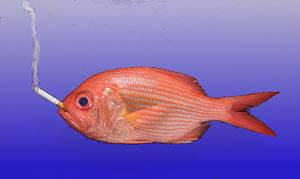UnNews:Lung Cancer On Rise in George's Bank Fish
22 April 2014
Halifax -- Pescatologists are concerned that lung cancer rates have been rising in fish living on Saint George's Bank off the coast of Nova Scotia. The financial impact could be substantial, as the spreading cancer could negatively impact fish populations, and could also impact sales, if consumers are found less willing to purchase fish which may be cancerous.
"Effer sinse ve shtarted finding lungz in theez vish ve haff been looking for zum zuch effect", said Dr. Fooblesnit, a professor at Cairo University, who is currently taking a sabbatical year at Wood's Hole Institute in Massachusetts. Dr. Fooblesnit told us the presence of lungs in George's Bank codfish is currently unexplained, but may be related to the presence of a Monsanto plant which was constructed several years ago at the mouth of the Saint Lawrence River. When asked how the plant might be related to fish lungs, Dr. Fooblesnit explained, "Dey do dis genetic stuff at dat plant. Is fine, is just plants dey vorking vit dere, no hanimals. But den dey is haffing those big shpills, hundred, two hundred tons of fancy genes all going into water at vunce, glub glub, and de vish iss eating it, munch munch, and iss getting dese weird genes in dem." When asked how fish could grow lungs from consuming plant genes, since plants don't have lungs, Dr. Fooblesnit said the answer to that is still speculative, but could involve some experiments Monsanto was doing in the creation of what they call autonomous corn plants, also known in the industry as mouse corn. "It's an interesting plant," Dr. Fooblesnit told us. "It's de only korn I haff effer heard vich sqveeks."
The lungs alone don't explain the cancer rates, however, even if they result from mouse genes. Additional pressure on the fish comes from open ocean garbage dumping, which has been going on for some years but may have a much larger impact on cod which have lungs than on other fish. "Ve tink it could be de butts", Dr. Fooblesnit told us. "Dey is havink a big impact on de vish. De vish, dey iss either eating dem or shmoking dem, ve not sure, but dey sure iss consuming dem, dat's for sure, and dey iss no better for a vish dan for a person."
The United Nations Council of Fisheries has also been studying the situation, but so far they have taken no concrete action beyond publication of a booklet printed on waterproof paper, and titled "The Hazards of Second Hand Butts". Large numbers of the books are to be dropped in the ocean over George's Bank.
